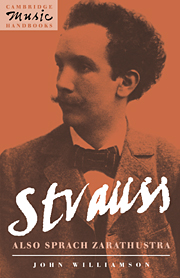3 - Strauss's individualism
Published online by Cambridge University Press: 04 August 2010
Summary
It may be an elementary point, but it is worth remembering that Nietzsche was still alive when Strauss composed Also sprach Zarathustra. The impact of his philosophy was still fresh, Also sprach Zarathustra having appeared in its entirety as a single-volume, four-part work only in 1893. For much of the long composition history of Guntram (1887–93), Strauss could not have read the fourth part of Also sprach Zarathustra unless he had access to one of the private printings arranged by Nietzsche for his friends in 1885. Nietzsche's dramatic mental collapse took place in 1889, and by the time Strauss started to read him seriously, it was apparent to the philosopher's increasing body of admirers that his career was closed. Strauss thus found himself in the position of writing a work inspired by a philosopher who, though alive, could never discuss it with him. There is no guarantee that such a hypothetical meeting would have been fruitful, given the lack of meaningful contact in the parallel case of Wagner and Schopenhauer. Serious discussion would also certainly have broken down at the first mention of Wagner, on whom their positions were irreconcilable; Wagner remained one of Strauss's idols, whereas to Nietzsche he was one of the principal idols to be destroyed. This reflects a more general problem that Strauss found with Nietzsche's writings. However much he came to admire them, his professional awareness of the composition process and the history of music baulked at Nietzsche's alternatives to Wagner.
- Type
- Chapter
- Information
- Strauss: Also sprach Zarathustra , pp. 20 - 30Publisher: Cambridge University PressPrint publication year: 1993

